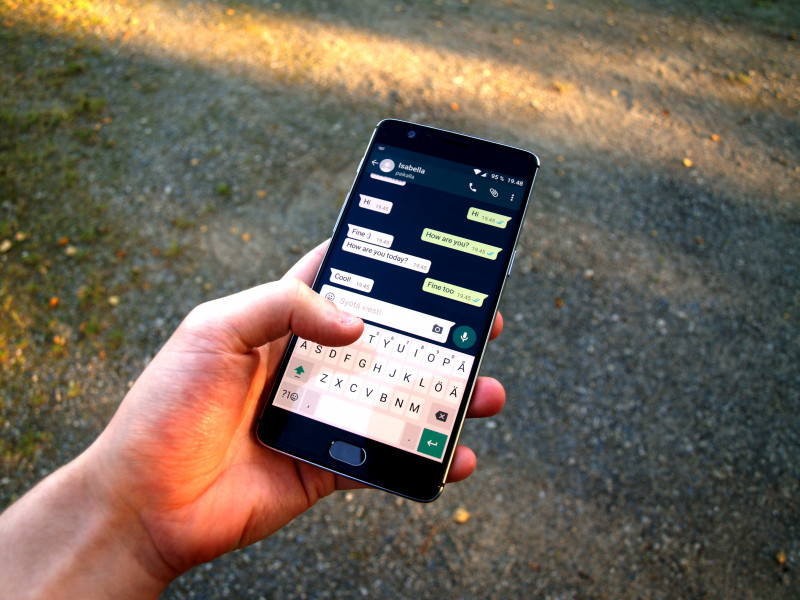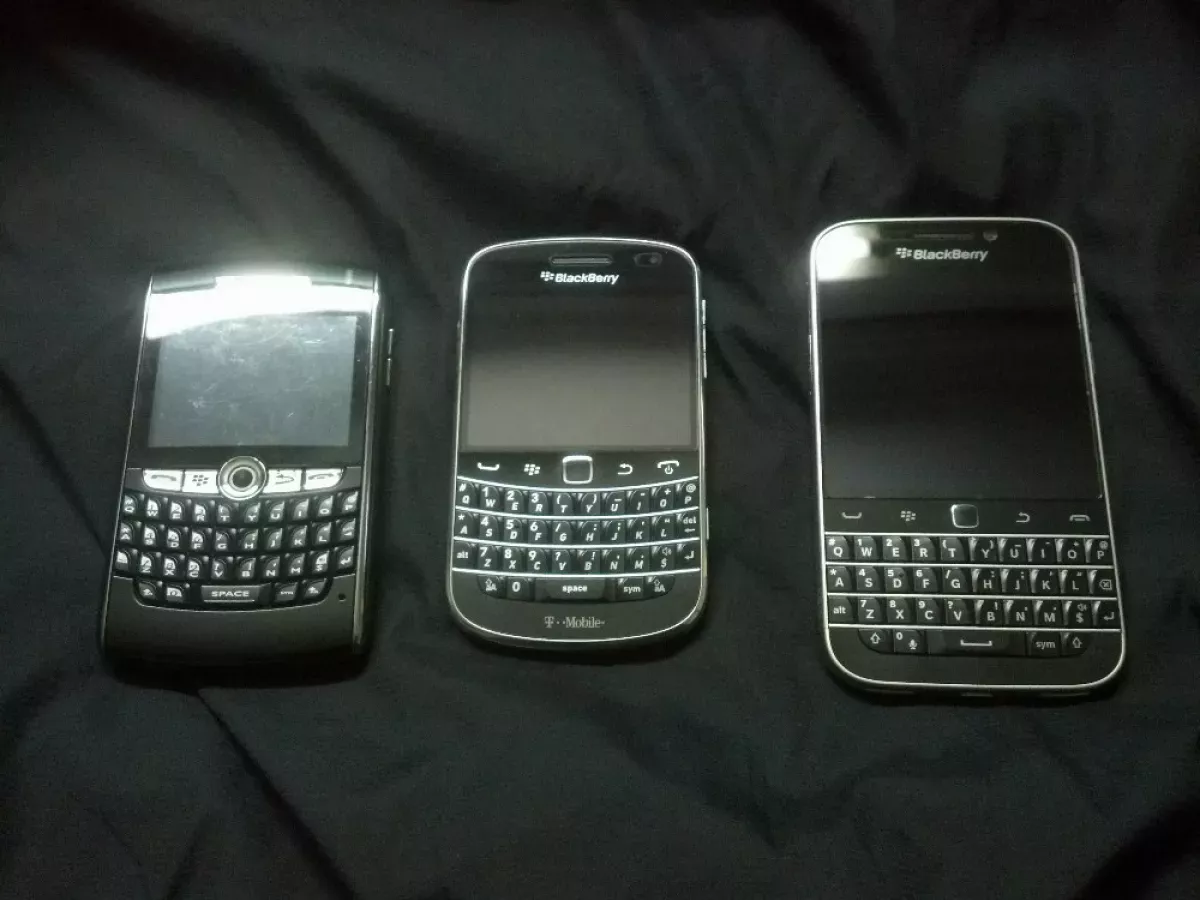BlackBerry, a once-popular brand of smartphones known for their physical keyboards and secure messaging, was developed by the Canadian company BlackBerry Limited. From 1999 to 2016, BlackBerry devices were highly successful, but the brand lost ground to touchscreen competitors. After 2016, BlackBerry Limited shifted focus, licensing the BlackBerry brand to other companies for continued production of mobile devices and services.
September 18, 1996: RIM Releases the Inter@ctive Pager 900
On September 18, 1996, Research In Motion (RIM) introduced the Inter@ctive Pager 900, a clamshell-style device that enabled two-way paging. This marked RIM's initial foray into the world of mobile communication devices and paved the way for the BlackBerry brand.
February 4, 1998: IBM Makes a Major Purchase of Inter@ctive Pagers
On February 4, 1998, IBM placed a significant order for RIM's Inter@ctive Pager 800, purchasing US$10 million worth of devices. This substantial deal demonstrated the growing corporate interest in RIM's communication solutions.
August 26, 1998: RIM Releases the Inter@ctive Pager 950
RIM launched the Inter@ctive Pager 950 on August 26, 1998. This device, while visually similar to the later BlackBerry 850, played a crucial role in the evolution of RIM's product line.
January 19, 1999: The First BlackBerry Device is Launched
On January 19, 1999, RIM released the BlackBerry 850, an email pager that marked a turning point in the company's history. Although resembling the Inter@ctive Pager 950, the 850 was the first to integrate email, and it was from this point onward that RIM adopted the BlackBerry name for its devices.
1999: BlackBerry Founded
Research In Motion (RIM), which would later become BlackBerry Limited, launched the first device under the BlackBerry brand in 1999.
1999: BlackBerry Debuts in Munich
The BlackBerry 850, RIM's inaugural BlackBerry-branded device, was first introduced in Munich, Germany, in 1999. The device was marketed as a two-way pager capable of sending and receiving emails over various wireless networks, showcasing RIM's focus on secure and efficient mobile communication.
2000: NTP Sues RIM over Wireless Email Patents
In 2000, NTP, asserting its wireless email patents, sent notices to several companies offering licensing agreements. Subsequently, they filed a patent infringement lawsuit against Research In Motion (RIM) in the United States District Court for the Eastern District of Virginia, known for its efficiency in handling patent cases.
2001: Eric Schmidt Becomes Google's Executive Chairman
In 2001, Eric Schmidt became the Executive Chairman of Google, a company that would later become a major competitor to BlackBerry with its Android operating system.
2002: The Convergent BlackBerry 5810 is Released
BlackBerry launched the 5810 smartphone in 2002. This device expanded upon the capabilities of its predecessors, offering push email, mobile phone functionality, text messaging, internet faxing, web browsing, and other wireless information services in a single package.
March 2005: RIM and NTP Attempt Settlement
During an appeal in March 2005, RIM and NTP engaged in settlement negotiations, aiming for a $450 million agreement. However, the negotiations collapsed due to other unresolved issues.
June 10, 2005: RIM and NTP Dispute Returns to Court
With the settlement talks failing, the legal battle between RIM and NTP resumed in court on June 10, 2005.
November 2005: US Department of Justice Intervenes in RIM-NTP Case
In November 2005, the US Department of Justice submitted a legal brief requesting the continuation of RIM's service. They cited the significant number of BlackBerry users within the US Federal Government as the reason.
2005: BlackBerry's Popularity and the "Crackberry" Nickname
By 2005, the BlackBerry's popularity surged in North America, earning it the nickname "Crackberry" due to its addictive nature.
2005: BlackBerry experiences short-term outage in North America
In 2005, BlackBerry faced a service outage that primarily impacted a limited number of carriers in North America. Service was restored after a few hours.
January 2006: Supreme Court Declines to Hear RIM's Appeal
The US Supreme Court, in January 2006, declined to hear RIM's appeal against the patent infringement ruling. This decision returned the case to a lower court, with the possibility of an injunction halting RIM's sales and BlackBerry usage in the US if a settlement wasn't reached.
February 9, 2006: US Department of Defense Emphasizes BlackBerry's Importance for National Security
The US Department of Defense (DOD) submitted a legal brief on February 9, 2006, arguing that an injunction against BlackBerry, even if excluding government users, would be impractical. They highlighted BlackBerry's critical role in national security due to its widespread use within the government.
March 3, 2006: RIM and NTP Reach $612.5 Million Settlement
After a stern warning from the judge, RIM and NTP announced a settlement agreement on March 3, 2006. RIM agreed to pay $612.5 million to NTP, marking a "full and final settlement." The agreement ended the litigation, eliminating further legal proceedings or decisions regarding damages or injunctions. Despite the substantial sum, some analysts considered it low due to the absence of future royalties on the disputed technology.
2006: Competition in the Mobile Market Heats Up
In 2006, BlackBerry faced increasing competition from Motorola, Palm, Inc., and Nokia devices.
December 2007: BlackBerry opens retail store in Michigan, offering devices from major U.S. carriers
In December 2007, BlackBerry opened a retail store in Farmington Hills, Michigan. This store provided a range of BlackBerry device models from major U.S. carriers, including AT&T, T-Mobile, Verizon, and Sprint. Notably, previous attempts to establish BlackBerry stores in Toronto, Canada, and London, United Kingdom, had been unsuccessful. BlackBerry also had stores operated by Wireless Giant at various airports in the U.S., but some of these were slated for closure.
2007: BlackBerry's e-mail service suffers outage, raising concerns about centralized system
In 2007, BlackBerry's email service experienced an outage, prompting questions and scrutiny regarding the reliability and robustness of the company's centralized system.
2008: Barack Obama's Attachment to BlackBerry
Barack Obama's use of a BlackBerry during his 2008 Presidential campaign and subsequent presidency, despite security concerns, was seen as a significant endorsement for the brand.
2008: BlackBerry Subscriber Base Doubles Despite Emerging Competition
By the end of 2008, when Android entered the market, BlackBerry's subscriber base doubled to 21 million, demonstrating continued growth despite new competition.
February 2009: 'Ndrangheta Use BlackBerry for Communication
In February 2009, reports emerged that the Italian criminal organization 'Ndrangheta was utilizing BlackBerry Messenger for overseas communication with the Gulf Cartel due to its perceived encryption security.
2009: BlackBerry suffers major outage across North America
In 2009, BlackBerry experienced a widespread outage that affected users throughout North America.
2009: BlackBerry's Dominance and Growth Despite iPhone's Rise
In 2009, RIM held a majority of the American smartphone market. Although the iPhone was gaining popularity, BlackBerry sales tripled between 2007 and 2009, becoming the top-selling smartphone and leading RIM to be named the fastest-growing company by Fortune.
2009: NSA Temporarily Loses Access to BlackBerry Devices
In 2009, the NSA experienced a brief period where they couldn't access BlackBerry devices due to changes in data compression. However, GCHQ, the British intelligence agency, regained access later.
November 24, 2010: RIM removes Kik Messenger from App World and sues Kik Interactive
On November 24, 2010, Research In Motion (RIM) took action against Kik Messenger, removing it from BlackBerry App World and limiting its functionality for users. RIM also filed a lawsuit against Kik Interactive, alleging patent infringement and trademark misuse.
2010: BlackBerry and Apple Lead the U.S. Smartphone Market
In 2010, BlackBerry and Apple remained dominant in the U.S. smartphone market. However, the iPhone 3GS surpassed the BlackBerry Curve as the highest-selling individual device.
2010: BlackBerry Grants Access to Governments Amidst Security Concerns
In 2010, RIM faced controversy by agreeing to provide access to private communications to the governments of the United Arab Emirates and Saudi Arabia, who threatened to ban services due to encryption hindering law enforcement.
March 2011: RIM introduces optional Android player for BlackBerry PlayBook tablet
In March 2011, RIM announced the availability of an optional Android player for its BlackBerry PlayBook tablet. This player allowed users to run applications developed for the Android operating system on their BlackBerry PlayBook devices.
August 24, 2011: Rumors emerge about BlackBerry devices potentially running Android apps
On August 24, 2011, Bloomberg News reported unofficial rumors suggesting that BlackBerry devices might gain the capability to run Android applications. This speculation arose from the possibility of RIM integrating QNX and the Android App Player into its BlackBerry operating system.
September 2011: BlackBerry Reaches Peak Subscriber Count
BlackBerry achieved its highest-ever subscriber count in September 2011, reaching 85 million users globally. This marked the pinnacle of BlackBerry's success in the mobile phone market.
October 12, 2011: Multi-day BlackBerry outage impacts millions globally, leading to calls for leadership change
Beginning on October 10, 2011, a significant outage struck BlackBerry's Internet Service, initially affecting users in Europe, the Middle East, and Africa. The outage, lasting for multiple days, impacted millions of users. By October 12, the outage had spread to North America. Research In Motion (RIM), BlackBerry's parent company, attributed the disruptions to data overload caused by switch failures in their data centers in Canada and England. The outage resulted in substantial financial losses for RIM, estimated to be between $50 million and $54 million. Moreover, it fueled demands from shareholders for a leadership overhaul within the company.
October 20, 2011: RIM confirms BlackBerry devices can run Android apps
On October 20, 2011, RIM made an official announcement confirming that BlackBerry devices, including the BlackBerry tablet and newer BlackBerry phone models, would be able to run Android applications without modification. This capability was enabled by the latest version of RIM's operating system.
2011: BlackBerry's Strong Presence in Indonesia
In 2011, BlackBerry held a commanding 43% of the Indonesian smartphone market.
2011: BlackBerry OS 7 released with enhanced features and wireless synchronization capabilities
In 2011, BlackBerry released OS 7 for its devices, a proprietary multitasking operating system. This version introduced features such as support for a subset of MIDP 2.0 and complete wireless activation and synchronization with Microsoft Exchange for email, calendar, tasks, notes, and contacts. Additionally, it included support for Novell GroupWise and Lotus Notes. BlackBerry devices running OS 7 could access apps through BlackBerry World (formerly BlackBerry App World).
2011: Eric Schmidt Steps Down as Google's Executive Chairman
In 2011, Eric Schmidt stepped down as Google's Executive Chairman, after a decade of leading the company that would become a major competitor to BlackBerry with its Android operating system.
2011: BlackBerry's Struggle and Speculation
In the early 2010s, BlackBerry struggled to keep up with the iPhone and Android, leading to speculation about its future. Despite reaching peak device sales in 2011, its market share declined in the following years.
June 2012: BlackBerry's Peak User Base
BlackBerry reached its peak global user base of 80 million in June 2012.
September 2012: BlackBerry Reaches 80 Million Subscribers
Following the iPhone 5's release in September 2012, RIM CEO Thorsten Heins announced a significant milestone: BlackBerry reached 80 million subscribers globally, causing a surge in the company's share price.
September 2012: RIM Announces Replacement of BlackBerry PIN
In September 2012, RIM revealed its plan to replace the BlackBerry PIN with BlackBerry ID in 2013, coinciding with the BlackBerry 10 platform launch.
2012: RIM CEO showcases BlackBerry 10 OS features at BlackBerry World
At BlackBerry World 2012, RIM CEO Thorsten Heins provided a glimpse into the upcoming BlackBerry 10 operating system. Heins demonstrated several notable features, including an advanced camera with frame-by-frame rewind for individual faces, an intelligent and adaptive keyboard, and a gesture-based user interface emphasizing "peek" and "flow." Apps for BlackBerry 10 devices would be available through the BlackBerry World storefront.
2012: BlackBerry Grants Access to Indian Government
Continuing its controversial practice, in 2012, RIM agreed to provide access to private communications to the Indian government, raising further concerns about user privacy and security.
January 30, 2013: BlackBerry Unveils Z10 and Q10 Smartphones
On January 30, 2013, BlackBerry announced the release of the Z10 and Q10 smartphones. The Z10 boasted an all-touchscreen design, while the Q10 combined a physical QWERTY keyboard with touchscreen capabilities, offering users a choice between different input methods.
March 5, 2013: BlackBerry Secures Contract with German Government
BlackBerry secured a substantial contract on March 5, 2013, to provide secure data and voice communication services for the German government. This deal, publicly signed by German Chancellor Angela Merkel, highlighted BlackBerry's continued reputation for robust security in the mobile communications space.
April 2013: BlackBerry announces closure of BBM Music streaming service
In April 2013, BlackBerry announced its decision to discontinue its BBM Music streaming service after almost two years of operation.
June 2, 2013: BlackBerry shuts down BBM Music streaming service
On June 2, 2013, BlackBerry shut down its music streaming service, BBM Music, which had been active for nearly two years since its launch.
August 12, 2013: BlackBerry Explores Sale of the Company
Facing mounting financial challenges and intensifying competition in the mobile industry, BlackBerry announced on August 12, 2013, its intention to explore a potential sale of the company. This decision underscored the serious difficulties BlackBerry was grappling with.
September 20, 2013: BlackBerry Announces Layoffs and Product Line Reduction
Citing lower-than-anticipated sales of the Z10 smartphone, BlackBerry announced on September 20, 2013, that it would be laying off 4,500 employees, roughly 40% of its workforce. Additionally, the company revealed plans to streamline its product line from six models down to four, further highlighting its efforts to adapt to the changing market dynamics.
September 23, 2013: Fairfax Financial Offers to Acquire BlackBerry
On September 23, 2013, Fairfax Financial, a shareholder with a 10% stake in BlackBerry, submitted a bid to acquire the struggling company for $4.7 billion, equivalent to $9.00 per share. BlackBerry accepted the offer provisionally but remained open to considering other proposals until November 4, 2013.
October 2013: RIM and Kik Interactive settle lawsuit
In October 2013, RIM and Kik Interactive reached a settlement agreement, resolving the lawsuit regarding Kik Messenger. The terms of the settlement were not disclosed.
November 4, 2013: BlackBerry Continues to Seek Potential Buyers
BlackBerry's deadline for considering alternative acquisition offers, following Fairfax Financial's bid, was set for November 4, 2013. This date marked a critical point in the company's efforts to secure its future.
November 13, 2013: John S. Chen Becomes Interim CEO, Issues Message of Resilience
John S. Chen, former CEO of Sybase, replaced Thorsten Heins as BlackBerry's interim CEO on November 4, 2013. Following the BlackBerry board's rejection of various acquisition proposals, Chen issued an open letter on November 13, 2013, emphasizing the company's commitment to reclaiming its past success, signifying a determination to turn the tide.
December 17, 2013: BlackBerry Secures Contract with Peugeot SA
BlackBerry secured a significant contract with Peugeot SA on December 17, 2013, for the supply of over 10,000 BlackBerry Z10 smartphones. This deal signaled that, despite its ongoing challenges, BlackBerry could still attract notable clients.
2013: Eric Schmidt's Preference for BlackBerry
Despite the competition between Android and BlackBerry in 2013, Eric Schmidt, former Google CEO, expressed his preference for BlackBerry devices, citing their physical keyboard.
2013: BlackBerry Launches BlackBerry 10 OS
In 2013, BlackBerry introduced BlackBerry 10, a significant overhaul of its operating system. This new platform, built upon the QNX operating system, aimed to replace the aging BlackBerry OS and offer a more modern user experience, aligning more closely with the features and functionalities of Android and iOS.
2013: BlackBerry World replaces BlackBerry App World as app storefront
In 2013, BlackBerry renamed its app storefront from BlackBerry App World to BlackBerry World, reflecting the evolving BlackBerry ecosystem.
2013: Government and Law Enforcement Use of BlackBerry
In 2013, various government agencies and police departments, such as the US State Department and the West Yorkshire Police, continued to rely heavily on BlackBerry devices for their security and efficiency.
2013: Nokia's Lumia Outsells BlackBerry
In a sign of the shifting tides in the mobile phone market, Nokia's Lumia model outsold BlackBerry handsets for the first time during the second financial quarter of 2013. Despite selling 6.8 million devices, BlackBerry faced increasing pressure from competitors like Nokia.
2013: Mass Surveillance Disclosures Expose BlackBerry Vulnerability
The 2013 mass surveillance disclosures revealed that the NSA and GCHQ had access to user data on BlackBerry devices. These agencies could reportedly access a wide range of information, including SMS, location, emails, and notes, due to BlackBerry Internet Service's lack of encryption.
February 26, 2014: Airbus Partners with BlackBerry for Mobility Management
During Mobile World Congress on February 26, 2014, Airbus entered into a contract with BlackBerry for its comprehensive BlackBerry 10 Mobility Management suite. This partnership demonstrated BlackBerry's continued relevance in providing enterprise mobility solutions.
April 2014: BlackBerry's Market Share Plummets in Indonesia
By April 2014, BlackBerry's market share in Indonesia plummeted to 3%, mirroring a global downward trend. The decline occurred despite a discounted launch offer for the Z3, which even led to a stampede and injuries.
May 13, 2014: BlackBerry Launches Z3 in Indonesia
On May 13, 2014, BlackBerry launched the Z3 globally in Jakarta, hoping to regain market share in Indonesia. The launch followed the announcement of RIM outsourcing hardware production to Foxconn to cut costs.
July 2014: BlackBerry's Stock Experiences Unexpected Surge
BlackBerry's stock price saw a remarkable 50% increase in July 2014, surpassing the performance of tech giants like Apple and Google and leading TechCrunch to publish an article highlighting the company as one of the year's hottest stocks. This surge, however, was attributed primarily to cost-cutting measures rather than improvements in revenue or profit margin. During this time, BlackBerry also launched the Passport handset, aimed at professionals in fields such as healthcare and architecture, further promoted its Messenger app, and released minor updates for its BB10 operating system.
July 2014: BlackBerry unveils BlackBerry Assistant for BlackBerry OS 10.3
In July 2014, BlackBerry introduced BlackBerry Assistant, a new digital personal assistant feature for devices running BlackBerry OS 10.3, including the BlackBerry Passport. The assistant aimed to enhance productivity by helping users stay organized and informed.
September 2014: BlackBerry's Dwindling User Base
By September 2014, BlackBerry's global user base plummeted to 46 million, a significant drop from its peak in June 2012, and its market share dwindled to less than 1%.
December 2014: BlackBerry and NantHealth partner to launch secure cancer genome browser on BlackBerry Passport
In December 2014, BlackBerry collaborated with NantHealth, a healthcare data provider, to launch a secure cancer genome browser specifically designed for the BlackBerry Passport smartphone. This browser allowed doctors to securely access and view patients' genetic data on their BlackBerry devices.
December 17, 2014: BlackBerry Launches the BlackBerry Classic
Aiming to recapture the essence of its earlier successful models, BlackBerry introduced the BlackBerry Classic on December 17, 2014. This device harked back to the design language of the popular Bold series, featuring familiar navigation buttons reminiscent of previous BlackBerry OS devices.
2014: BlackBerry Sales Decline
In 2014, BlackBerry saw a substantial decrease in handset sales compared to the previous year.
2014: Kim Kardashian's BlackBerry Loyalty
In 2014, celebrity Kim Kardashian publicly declared her strong attachment to BlackBerry phones, particularly the Bold model, expressing concerns about the brand's potential disappearance.
September 2015: BlackBerry Unveils the Android-Powered BlackBerry Priv
In September 2015, BlackBerry officially launched the BlackBerry Priv, a slider-style phablet running the Android operating system. The Priv featured an 18-megapixel camera with a German-made lens and incorporated security and productivity features inspired by BlackBerry's own operating systems. Despite this move towards Android, BlackBerry COO Marty Beard stated that the company hadn't ruled out producing future BB10 devices.
September 23, 2015: BlackBerry opens pop-up store in Frankfurt
On September 23, 2015, BlackBerry opened a pop-up store in Frankfurt, Germany, expanding its retail presence.
November 2015: BlackBerry launches Priv, its first Android smartphone
In late November 2015, BlackBerry released the Priv, marking its entry into the Android smartphone market. The Priv launched with Android 5.1.1, later upgraded to Android 6.0 Marshmallow, and was initially available in four countries.
December 18, 2015: BlackBerry Reports Declining Sales but Increasing Average Price
On December 18, 2015, BlackBerry reported a significant drop in handset sales compared to 2014. However, the average selling price per unit increased, partially attributed to the premium-priced Android Priv device.
2015: BlackBerry Releases Its First Android Phone
Marking a shift in strategy, BlackBerry released its first Android-based smartphone, the BlackBerry Priv, in 2015. This move signaled the company's willingness to embrace the dominant Android platform while still incorporating its signature security and productivity features.
February 2016: BlackBerry Lays Off Staff Amidst Market Share Decline
In February 2016, due to a shrinking user base, BlackBerry laid off a significant portion of its workforce in Waterloo, Ontario. The company's market share had dwindled to nearly zero.
February 28, 2016: BlackBerry Priv becomes available in 31 countries
By February 28, 2016, the BlackBerry Priv, BlackBerry's first Android smartphone, had expanded its availability to 31 countries.
March 2016: BlackBerry's Subscriber Base Declines Sharply
By March 2016, BlackBerry's subscriber base had plummeted to 23 million, representing a decline of almost 75% from its peak in 2011. This drastic drop highlighted the company's struggle to compete with the rising popularity of Android and iOS smartphones.
June 2016: BlackBerry Classic Discontinued
The BlackBerry Classic, launched in December 2014 as a throwback to the company's earlier designs, was discontinued in June 2016. This marked the end of an era, as it was the last BlackBerry device to feature a physical keyboard that dominated the front of the phone in the classic style.
July 26, 2016: BlackBerry Hints at New Keyboard Model and Unveils DTEK50
On July 26, 2016, BlackBerry hinted at the upcoming release of a new model featuring a physical keyboard. The same day, they launched the BlackBerry DTEK50, a mid-range Android phone with a focus on security. The DTEK50, powered by Android Marshmallow, featured a 5.2-inch FHD display and built-in malware protection and encryption. Notably, it was a re-branded version of the Alcatel Idol 4 with added security customizations.
September 2016: BlackBerry Forms Joint Venture in Indonesia
In September 2016, BlackBerry Limited partnered with an Indonesian company to form BB Merah Putih, a joint venture focused on distributing and marketing BlackBerry phones in Indonesia.
September 28, 2016: BlackBerry Announces Shift to Licensing Model
On September 28, 2016, BlackBerry Limited made a pivotal announcement, stating that it would discontinue designing its own devices. Instead, the company would focus on licensing its brand and software to partner companies, who would then handle the design, manufacturing, and marketing of BlackBerry devices.
October 2016: BlackBerry Partners with Ford on Software Development
In October 2016, BlackBerry announced its collaboration with Ford Motor Company of Canada to develop software for connected vehicles.
October 25, 2016: BlackBerry Releases DTEK60
BlackBerry launched the DTEK60 on October 25, 2016. Manufactured by TCL, the DTEK60 boasted a 5.5-inch Quad-HD display, Snapdragon 820 processor, Quick Charge 3.0, USB Type-C, and a fingerprint sensor.
2016: BlackBerry Owes Qualcomm Royalties
BlackBerry owed Qualcomm royalties for calendar year 2016 as part of their settlement agreement.
2016: BlackBerry Shifts Away from In-House Manufacturing
In 2016, BlackBerry Limited made the significant decision to stop designing and manufacturing its own devices. Instead, the company transitioned to a licensing model, partnering with other companies to create and sell BlackBerry-branded phones.
February 2017: Class Action Lawsuit Filed Against BlackBerry
February 2017 saw the announcement of a $20 million class action lawsuit against BlackBerry, filed by former employees of the company.
March 2017: BlackBerry Aurora Launched in Indonesia
BB Merah Putih, BlackBerry's Indonesian joint venture, launched the BlackBerry Aurora in March 2017. This Indonesian-made and sold device ran on an operating system based on Android 7.0.
April 12, 2017: BlackBerry and Qualcomm Enter Arbitration
BlackBerry and Qualcomm entered into arbitration, with an interim decision announced on April 12, 2017.
May 26, 2017: BlackBerry and Qualcomm Reach Settlement Agreement
On May 26, 2017, BlackBerry and Qualcomm reached a final settlement agreement. Qualcomm agreed to pay BlackBerry a total of US$940 million, including interest and attorney fees, net of certain royalties due from BlackBerry.
2017: BlackBerry Releases KeyOne, Aurora, KeyOne L/E BLACK, and Motion
Throughout 2017, BlackBerry Mobile released several devices. Notably, they launched the BlackBerry KeyOne, known for its physical keyboard and long battery life, which was also the last device designed in-house. They also released the BlackBerry Aurora, BlackBerry KeyOne L/E BLACK, and the BlackBerry Motion through their partner licensing agreements.
March 2018: BlackBerry Partners with Jaguar Land Rover
In March 2018, BlackBerry announced its collaboration with Jaguar Land Rover to develop software for their vehicles.
June 2018: BlackBerry Key2 Launches in International Markets and India
Following its global launch, the BlackBerry Key2 was released in international markets and India in June 2018. The Indian launch was handled by licensee Optiemus Infracom. The Key2 featured a dual-camera setup with portrait mode and optical zoom.
June 2018: BlackBerry Launches KEY2 with Physical Keyboard
The BlackBerry KEY2, launched in June 2018, marked the third Android device from BlackBerry to feature a physical keyboard. The launch was a global event held in New York.
August 2018: Optiemus Infracom Launches BlackBerry Evolve and Evolve X in India
After the Key2's launch, Optiemus Infracom, BlackBerry's licensee in India, released the BlackBerry Evolve and Evolve X smartphones exclusively on Amazon India in August 2018. These smartphones were conceptualized, designed, and manufactured in India.
2018: BlackBerry to sue Facebook over intellectual property infringements
In 2018, reports emerged that BlackBerry planned to pursue legal action against Facebook, claiming that the social media giant had infringed on BlackBerry's intellectual property. The lawsuit was related to Facebook Messenger, WhatsApp, and Instagram.
2018: Last Update from Optiemus on BlackBerry Products
The last update regarding BlackBerry products in India from Optiemus Infracom was in 2018.
2019: BB Merah Putih Shifts Focus to Technical Support
By 2019, BB Merah Putih's website had been repurposed to focus solely on providing technical support for the Indonesian-built BlackBerry devices.
September 2020: Uncertainty Surrounds Optiemus's BlackBerry Operations
As of September 2020, the operational status of Optiemus Infracom regarding BlackBerry products in India became unclear due to a lack of updates since 2018.
2020: OnwardMobility Signs Licensing Agreement with BlackBerry for 5G Smartphone
In 2020, OnwardMobility, a Texas-based startup, secured a licensing agreement with BlackBerry Limited to develop a new 5G BlackBerry smartphone. They aimed to revive the brand through an Android-based, next-generation device with Wi-Fi capabilities. The project involved collaboration with BlackBerry Limited and FIH Mobile, a Foxconn subsidiary.
January 2021: BlackBerry and Facebook settle intellectual property lawsuit
In January 2021, BlackBerry and Facebook reached a settlement in a legal dispute concerning allegations of intellectual property infringement. BlackBerry had accused Facebook of infringing on its intellectual property with its apps, including Facebook Messenger, WhatsApp, and Instagram. The settlement amount was not made public.
January 3, 2022: BlackBerry announces end of service for legacy BlackBerry phones
On January 3, 2022, BlackBerry made an announcement that it would be ending support for all BlackBerry phones running on operating systems other than Android. This decision meant that, as of January 4, 2022, these legacy devices would no longer have reliable functionality for essential services, including data, phone calls, SMS, and 9-1-1 access, regardless of whether they were connected through a carrier network or Wi-Fi.
January 4, 2022: End of Life for Legacy BlackBerry Devices
On January 4, 2022, BlackBerry announced that older phones running BlackBerry 10, 7.1 OS, and earlier would no longer be supported, marking the end of an era for these devices.
February 18, 2022: OnwardMobility Cancels 5G BlackBerry Smartphone Project and Shuts Down
On February 18, 2022, OnwardMobility announced the termination of the 5G BlackBerry smartphone project. Citing unforeseen circumstances, they also announced the shutdown of the company.
August 2022: "BlackBerry" Film Production Wraps
In August 2022, production wrapped on "BlackBerry," a docudrama film chronicling the rise and fall of the BlackBerry brand, adapted from the book "Losing the Signal."
September 2022: "BlackBerry" Film Acquired by IFC Films
In September 2022, IFC Films secured the US distribution rights for the "BlackBerry" film, setting the stage for its theatrical release.
February 2023: "BlackBerry" Film Premieres at Berlinale
A comedy-drama film titled "BlackBerry," chronicling the rise and fall of the iconic phone, made its debut at the 73rd Berlin International Film Festival in February 2023.
May 2023: "BlackBerry" Film Released
May 2023 marked the release of the "BlackBerry" film, providing a cinematic portrayal of the company's history to a wider audience.
October 2023: John Chen Steps Down as BlackBerry CEO
In October 2023, John Chen, BlackBerry's Chief Operating Officer, announced his departure from the company after a decade. Richard Lynch was appointed as the interim CEO and chair of the board.
Mentioned in this timeline

WhatsApp is a widely-used instant messaging and VoIP service owned...

Instagram is a photo and video-sharing social networking service owned...
Facebook is a social media and networking service created in...

Barack Obama the th U S President - was the...

Kim Kardashian is an American media personality socialite and businesswoman...

Google LLC is a multinational technology company specializing in online...
Trending
Joe Gibbs is a celebrated former American football coach most notably with the Washington Redskins now Commanders In his seasons...
2 months ago Hurricanes Edge Flames 1-0 in Overtime Thriller: Bussi's Performance Highlighted

6 months ago Bam Margera Returns to Tony Hawk's Pro Skater 3 + 4 After Chance Visit

Airlines are companies that offer air transport services for passengers and freight using aircraft They may form partnerships with other...

Miguel And jar is a Dominican professional baseball player currently with the Cincinnati Reds He plays both left field and...
Jeff Ulbrich is a former NFL linebacker and current defensive coordinator for the Atlanta Falcons After a college football career...
Popular

Thomas Douglas Homan is an American law enforcement officer who...

Martin Luther King Jr was a pivotal leader in the...

XXXTentacion born Jahseh Dwayne Ricardo Onfroy was a controversial yet...
Matt and Ross Duffer known as the Duffer Brothers are...

William Franklin Graham III commonly known as Franklin Graham is...

Instagram is a photo and video-sharing social networking service owned...
